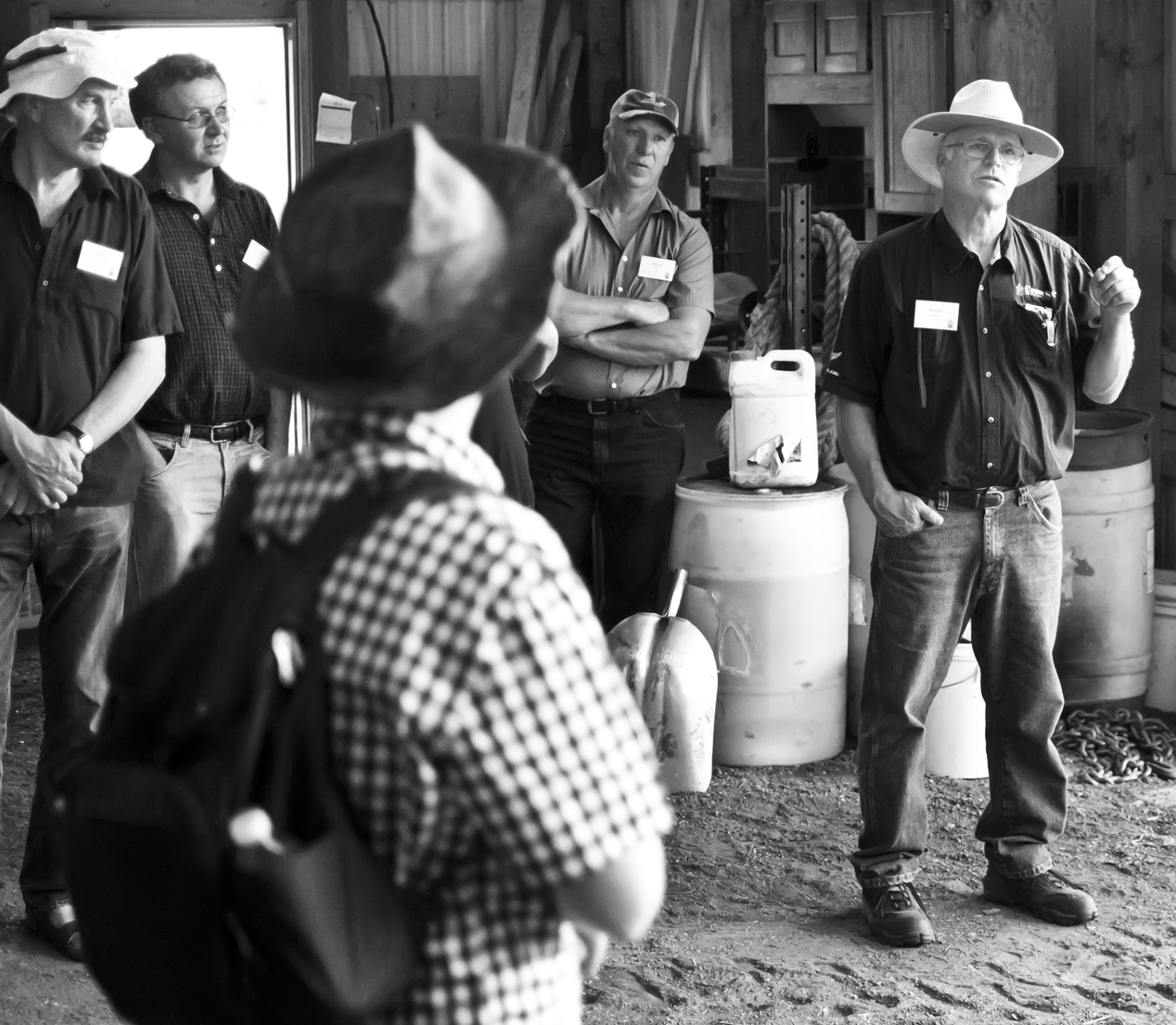News
No-tillage conference serves as exchange of cultures and ideas
Matthew Semisch
07/22/2014

A farmers’ conference and field tour in Willow City last Tuesday served as a gathering place for growers to come together and share ideas with one another.
Unlike most such summits, though, this one had an international flair to it.
Cross Slot No-Tillage Systems, a company based in New Zealand but which has a wholly-owned subsidiary in the American Pacific Northwest, recently finished its 19th annual conference and field tour.
The event alternates between the northern and southern hemispheres, with New Zealand having hosted last year’s event after areas of France and Germany played host in 2012. This year’s conference and tours took place in both North Dakota and Saskatchewan.
Along on the tour were farmers from New Zealand as well as North Dakota, South Dakota, Kansas and Canada. One of their stops was in Willow City on land owned by Kevin Larson, a product specialist for Cross Slot who uses the company’s no-tillage equipment on his own land.
No-till farming is a method of growing crops and pastures that minimizes disturbance of the soil. The technique increases the amount of water that enters the soil and also increases the cycle of nutrients and organic matter retention therein.
“We’ve been no-tilling here for over 30 years, and I think our first crop that we planted using these methods would’ve been in the fall of 1981,” Larson said. “That back then was with a rented drill just to put in some winter wheat, but by the next spring we’d gotten our own no-till drill and have been no-tilling ever since.”
The method Larson uses on his land isn’t universally applied by farmers in this area, which Cross Slot considers to be a developing market for no-tillage. That said, Larson says he has noticed that area farmers have moved toward applying the method he uses in his fields.
“Most of the farmers in this area would probably not call themselves no-tillers,” Larson said, “But instead they’re direct seeders and are using various forms of tillage to get their seed and fertilizer into the ground, but they’re all using reduced tillage compared to how it used to work.”
Bill Ritchie, a New Zealand national who serves as the general manager and director of Cross Slot, hoped to show interested parties at the conference how farmers in this area using Cross Slot equipment in their fields are benefiting.
“Our main objective here is to really look at how our Cross Slot technology is being applied in North Dakota,” Ritchie said. “Through coming here and some of these folks look at what Kevin’s doing here with his farm and want to do it themselves and then spread the word from there.”
“We’re promoting no-tillage, and that’s just about minimizing the disturbance of the soil we’re using,” he continued. “With this particular technology, I can look at Kevin’s farm here and know that, if we ran our machine through these fields, you literally would have trouble seeing where (the machine has) been.”
Ritchie said that he understands farmers’ desire to stick to what they’ve come to know and stick to more traditional farming methods that do include tillage of the soil. However, Ritchie feels that Cross Slot and no-tillage farming provide a better way.
“We know from research that soil that has been under continuous no-tillage actually has better drainage than soil that’s been tilled,” Ritchie said, “And that’s because the roots of your plants grow down and create natural drainage and aeration channels in the soil.
“Then you get earthworms that get active because the residue on top is their food, so that’s creating channels and taking organic matter down into the soil. What you’re then left with is better-aerated and better-drained soil naturally under a no-till system.”
Larson has been working with Cross Slot for four years and has visited New Zealand twice. He enjoys the exchange of cultures and ideas that such a partnership promotes.
“It’s through things like this that we have a great opportunity to have an international connection, and that’s the fun thing,” Larson said. “With these guys, even when we’re not together, I’ll be on Skype and calling out to New Zealand that way on pretty much a daily basis.
“All that you have to do is get used to the time difference, and that’s easy enough. They’re getting to work at about three o’clock in the afternoon our time, so from then until about when I go to bed, that’s when they’re at work, so it works out well because I can come in at the end of my work day and talk to them at a time that’s convenient for all of us.”
As for the conference last Tuesday, Larson said he hopes it will help to raise awareness among other farmers about the method he’s been using and how it can also benefit them.
“It seems for many people that the question is about why more people aren’t using no-tillage or this and that, and I don’t know the answer to that,” Larson said, “But it’s here and it’s available and it’s up for the farmers to recognize the technology’s and method’s work.
“That’s why we’re having this conference here today, and we know that these folks will then go ahead and, if you like, vote with their dollars.
“We’re not a big company, but as we get the word out about what we’re trying to do and make sales and spread the news, the hope is it’ll take off more people will come around to how we’re operating.”
